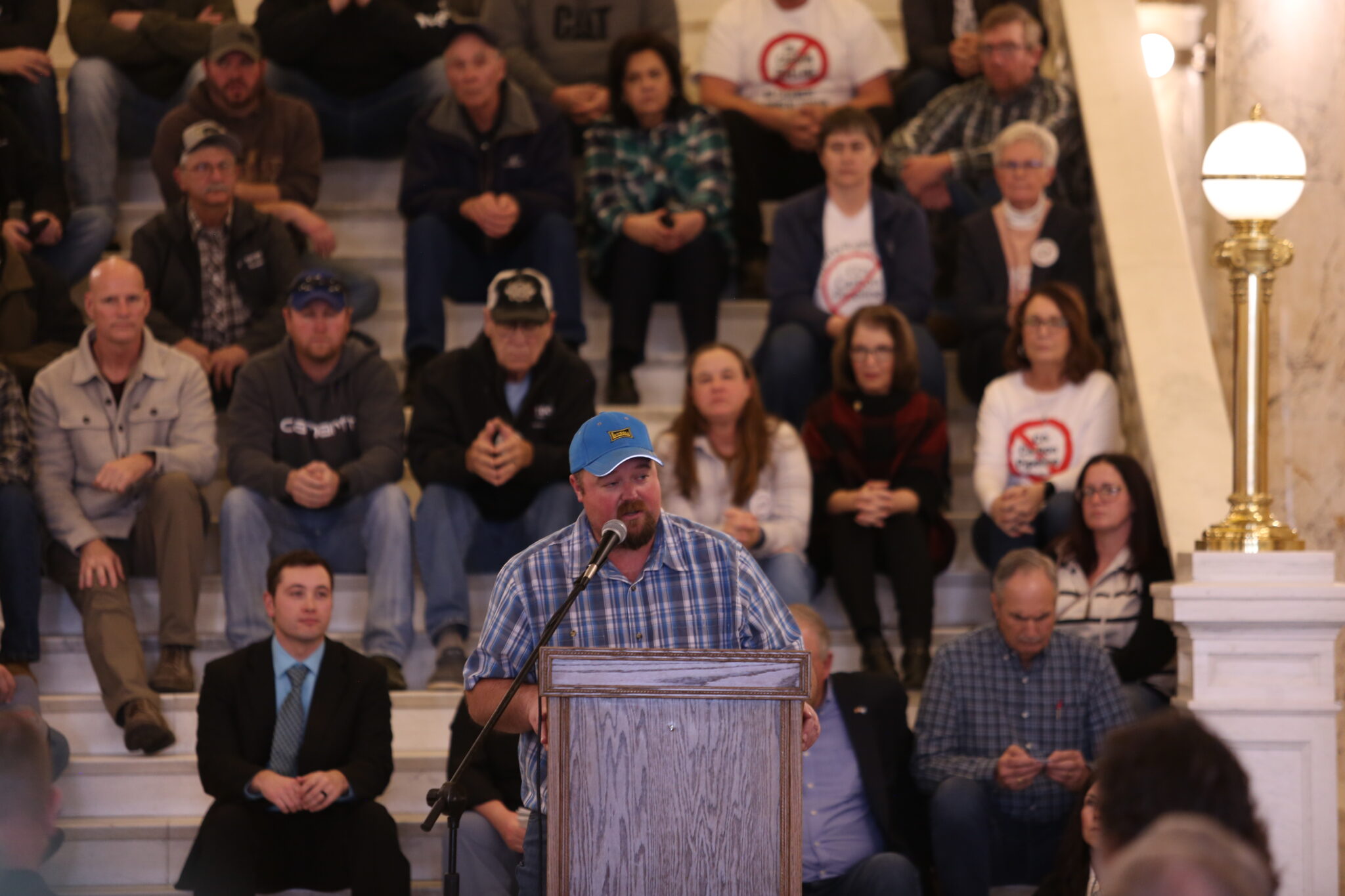
Joshua Haiar/South Dakota Searchlight
PIERRE — About 200 landowners braved the winter weather Monday to descend on the state Capitol and demand greater property rights protection and local control in the face of a proposed carbon dioxide pipeline.
The rally occurred one day before Governor Kristi Noem is scheduled to kick off the 2024 legislative session with her State of the State address.
The opponents of CO2 pipelines want lawmakers to pass legislation prohibiting the pipelines from utilizing “eminent domain,” a legal maneuver to access land for a project without landowners’ consent; and to defend the right of counties to set their own pipeline setback ordinances, which determine the minimum distance required between pipelines and existing structures or features.
“Let’s keep the local control in the hands of the citizens that know their local communities best,” Ed Fischbach, a farmer from rural Aberdeen, told the crowd.
The rally in the rotunda underscored the tensions surrounding the remaining CO2 pipeline proposal in South Dakota.
That project, proposed by Iowa-based Summit Carbon Solutions, would collect carbon dioxide emissions from 32 ethanol plants, including some in South Dakota, and transport it for underground storage in North Dakota. Doing so would make the project eligible for federal tax credits that incentivize greenhouse gas sequestration and could create access to new ethanol markets, according to proponents. Those include states demanding cleaner ethanol, and new ventures like ethanol-based jet fuel.
The South Dakota Public Utilities Commission denied Summit a permit last year, citing problems including conflicts with county setback ordinances. Summit plans to resubmit an application.
A recently formed group, South Dakota Ag Alliance — one of several interest groups formed in response to CO2 pipeline proposals — has said it will push to replace the minimum setback distances for carbon pipelines adopted by counties with a statewide standard.
“At the state level, we should talk about setbacks,” the organization’s co-founder, Rob Skjonsberg, told South Dakota Searchlight last year. “You could end up with a complete hodgepodge of setback distances. And if you’re a company, how do you deal with that? It’s nonsense.”
South Dakota Ag Alliance said it would also advocate for reforms of land survey processes, liability protections for landowners, minimum depth requirements for pipelines, and additional recurring compensation for landowners.
Critics, including landowners present at the rally, argue that the use of eminent domain by the project would infringe on property rights, and a statewide setback law would undermine local control.
Mark Lapka, a farmer from Leola, described those issues as “fundamental principals our state claims to care about.”
“South Dakota’s soils and topographies are diverse, and no one-size-fits-all approach will be better than what we have,” Lapka told South Dakota Searchlight. “Which is to leave it up to the counties who know what’s best for the people from there.”
Jason Glodt, co-founder of the South Dakota Ag Alliance, responded in an email to South Dakota Searchlight.
“I believe people would be surprised to know that a super majority of landowners on the proposed route see merit in the pipeline project,” he wrote. “Unfortunately, that fact is being lost as a result of all of the campaigning that has been going on.”
Rural advocate Amanda Radke offered a different take during the rally.
“We are not a small minority that’s causing a ruckus,” she said. “It’s not about just one pipeline. It’s that a dozen more projects are waiting in the wings.”
Summit Carbon Solutions says it has negotiated voluntary easements with about 70% of landowners along the project’s multi-state footprint.
